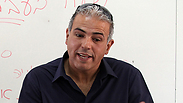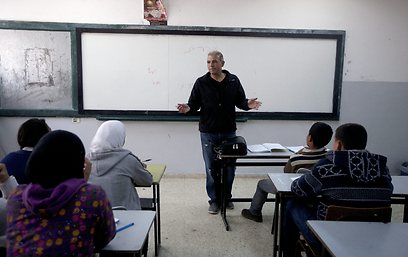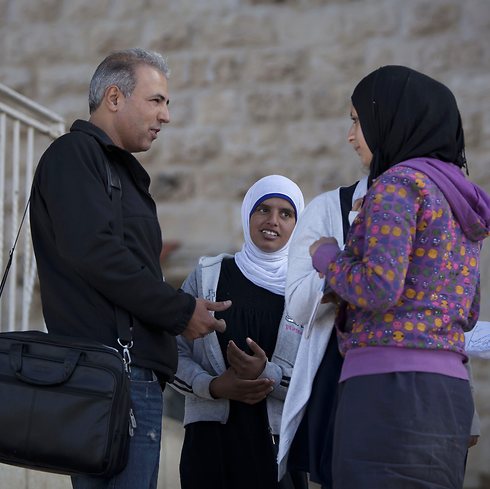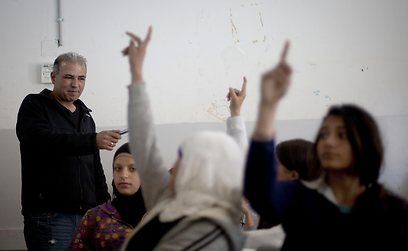
Ex-Palestinian prisoner teaches Hebrew and tolerance
Esmat Mansour, who helped 3 older teens stab an Israeli man to death in 1993, was freed in August 2013 in the first of the prisoner releases.
DEIR JARIR - Facing a classroom of Palestinian 10th graders, Hebrew teacher Esmat Mansour asks his students who is for and against learning the language. A few raise their hands in favor, others against and he asks both sides to explain.
Mansour believes such debates will help motivate young Palestinians to study Israel's dominant language. They need to know Hebrew to be able to deal with "the Israeli occupiers," but also to build bridges in the future, he says.
The 37 year old's view of the conflict with Israel is the product of a violent past, as he at 16 helped three older teens stab to death an Israeli man in 1993. Mansour was sentenced to 22 years as an accomplice in the killing of 30-year-old Haim Mizrahi, and was granted early release last year, along with dozens of other long-held prisoners, in a deal brokered by the United States.
Now free, Mansour's new life comes as Mideast peace talks falter. Mansour said he has no regrets, but also that he would never take another life.
"The most important thing is to ... value all human life and to learn tolerance," he said. Then, "we were very young, the political situation was different, we were very much zealots."
To many Israelis, such words ring hollow. They view Mansour and other Palestinians who killed Israelis in politically motivated attacks as terrorists who should remain behind bars.
Mizrahi's brother Itzik, 32, said the released prisoners are able to rebuild their lives, while the families of their victims suffer. "We remain without my brother," he said. "Only we have missed out, only my brother has missed out." Mizrahi's wife was pregnant at the time, and his daughter Tehila is now 20.
Palestinians say such killings came in the context of a decades-old conflict, and that a refusal to release Palestinian prisoners raises doubts about Israel's willingness to move toward peace.
It's no surprise that the emotionally charged disagreements over blame and forgiveness last week triggered the worst crisis between the sides since US Secretary of State John Kerry helped restart negotiations last summer.
As part of the terms for resuming talks, Israel had promised to release 104 long-held Palestinian prisoners such as Mansour in four installments - while the Palestinians said they would suspend efforts to seek further international recognition for a "state of Palestine."
Israel postponed the release of the final group. The Palestinians responded by signing up "Palestine," recognized in 2012 by the UN General Assembly, for 15 international conventions. Israel then canceled the final prisoner release.
Mansour was in the first group that was released in August.
On the last day in prison, agents from Israel's Shin Bet security service met with each of the 26 inmates slated for release and handed them maps of home districts they were not allowed to leave for a year. An agent showed Mansour a satellite image of his village of Deir Jarir, pointed to Mansour's family house and said he would be monitored at all times.
Mansour's family celebrated his release by slaughtering 25 goats. But once the celebrations were over, Mansour had to learn how to drive and navigate the Internet.
But he had no financial worries. In a typical homecoming package, the Palestinian self-rule government gave him $50,000, the rank of colonel and a monthly stipend of 6,000 shekels ($1,725), a higher-than-average income. Mansour also got engaged in December to a 23-year-old university student from Deir Jarir and their wedding is planned for August.
Still, Mansour said it took time to find his bearings.
He now teaches Hebrew once a week at a private Christian high school in a nearby village. During a recent lesson, he asked students to write the names of their village on the whiteboard in Hebrew, and count and recite the days of the week. Meticulously, he corrected their pronunciation.
Mansour remains active in the Democratic Front for the Liberation of Palestine, a tiny PLO faction, but favors a peace agreement with Israel. He is careful not to run afoul of Shin Bet restrictions; a violation could force him to serve the remaining two years of his term.
Mansour frequently passes near the scene of Mizrahi's killing - a chicken farm where Mansour worked after school as a teenager. On October 29, 1993, he showed three older teens where they could lie in wait for Mizrahi. Mizrahi, a resident of a nearby settlement, had come in the past to buy eggs and did so again that day. Mansour said the group planned to take Mizrahi hostage but he struggled and his attackers stabbed him to death. Mansour says he did not stab Mizrahi himself.
The older boys put Mizrahi's body in the trunk of his car, drove off and burned the vehicle to destroy evidence while Mansour remained behind, pretending to have been the victim of a robbery. He said he was arrested the same day and later confessed.
Mansour said that at the time, just a month after Israel and the PLO recognized each other in a precursor to peace talks, he believed that violence would further hasten the end of Israel's occupation of Palestinian lands.
Mansour said prison changed him. Behind bars, he learned Hebrew, read for hours each day and wrote three novels. While remaining a Palestinian nationalist, he began to see the world, including Israelis, in a more complex way.
"I lived through a very hard experience," he said. "This gave me insight and a belief in the cause, but more importantly that justice should be carried out in a humane and a just way."













